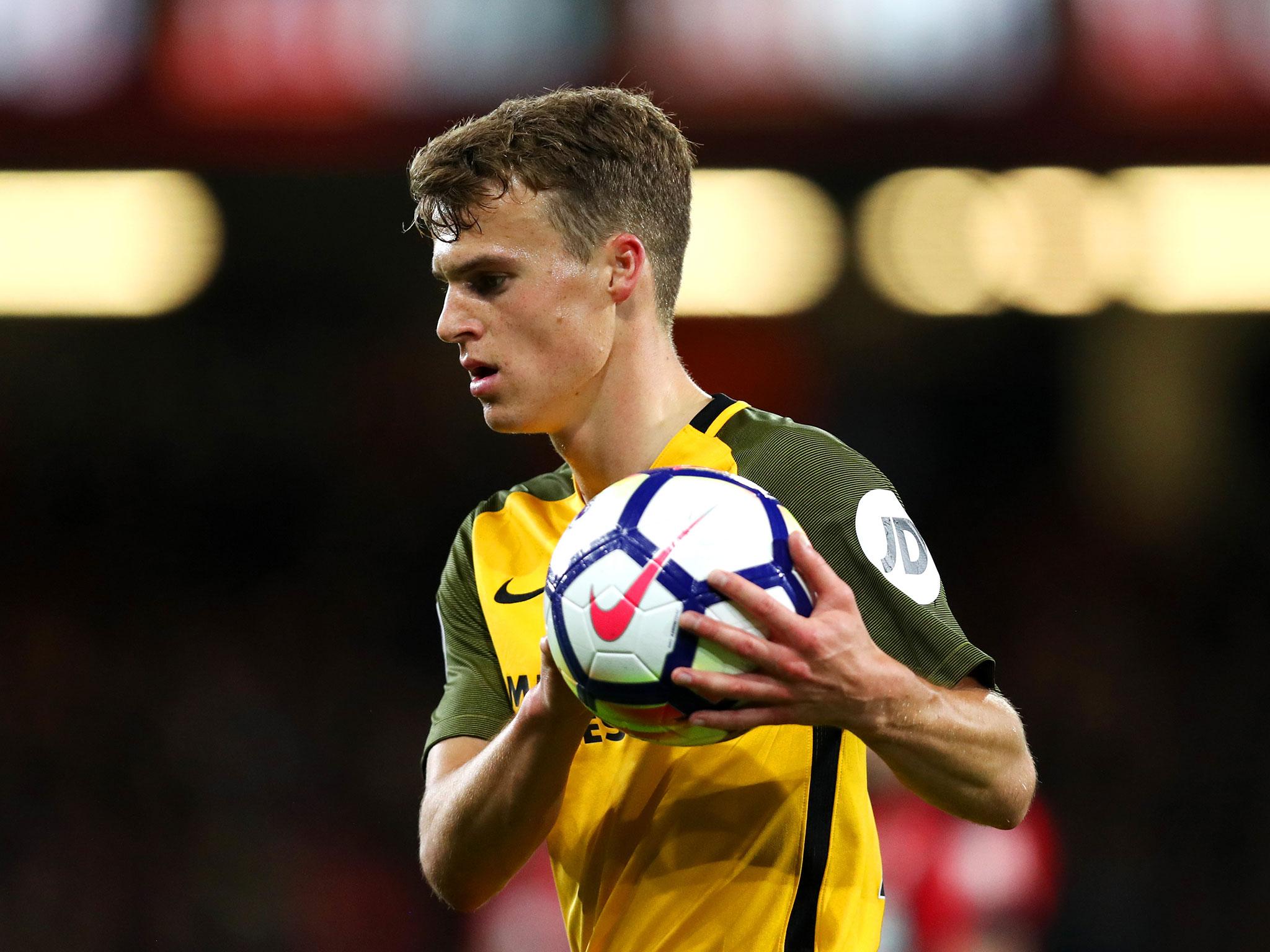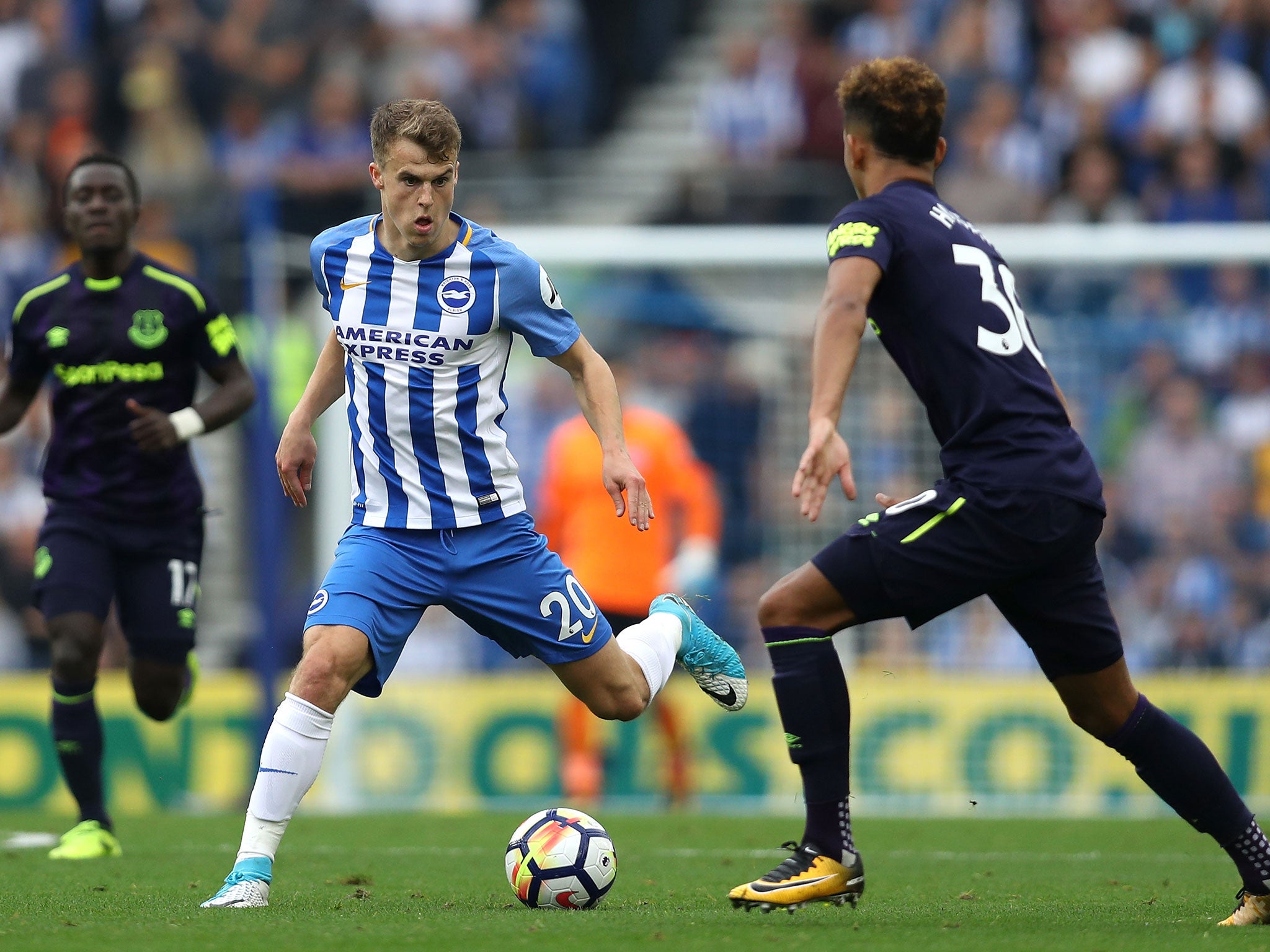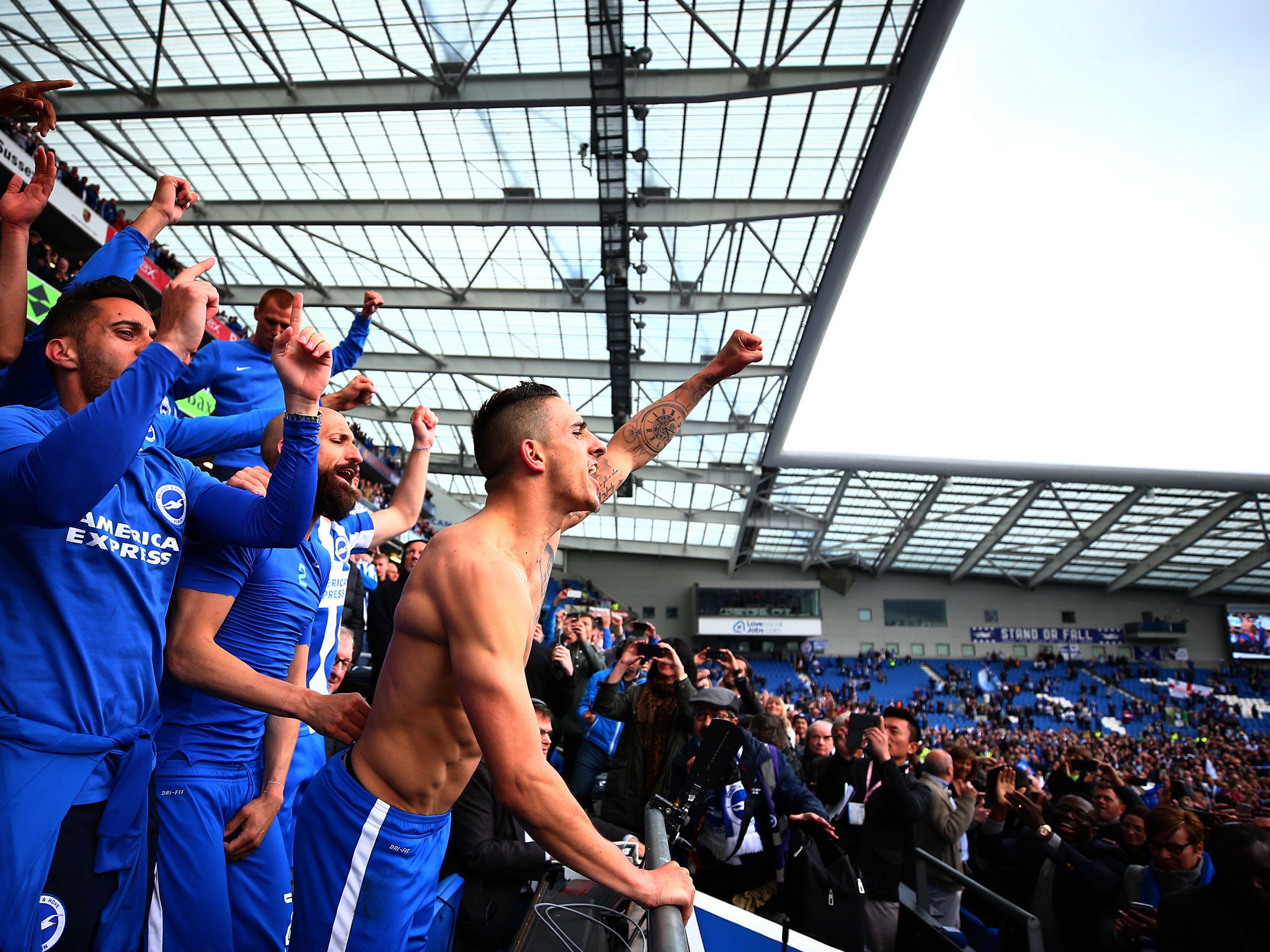From top dogs to underdogs: Brighton's Solly March on life in the Premier League and his long road back to fitness
Exclusive interview: The Brighton winger talks to the Independent about recovering from his long-term knee injury and adjusting to life in the Premier League

Solly March is a feel good story wrapped in a feel good story. Most neutrals delighted in Brighton’s promotion to the Premier League, 20 years after they were saved from dropping out of the Football League on the last day of the season. That the revival was driven by a chairman, Tony Bloom, who has been a lifelong fan and a manager, Chris Hughton, usually thought of as football’s nicest man, was an added bonus.
But the goal that effectively sealed promotion represented another tale to warm the heart. When March notched their second against Wigan in April, a 2-1 win that would ultimately see their elevation confirmed, it was a fitting cap to his comeback from a cruciate ligament injury that had ruled him out for just under a year.
March’s face wasn’t quite as prominent as some in the extensive celebration photos that followed, as Brighton players travelled on the train from the stadium for a long night soaking up the adulation of a whole town. He seemed happy just to revel in the achievement.
But if he continues his start to the season in the top flight, anonymity might be a little trickier to come by. March has started every game bar one of Brighton’s season so far, dancing in from the wing to stand out as one of their star performers as Hughton’s side have begun the campaign about as well as they could have hoped. “Everyone’s enjoyed it, which helps,” March says.
March is starting to rival favourites like Lewis Dunk and Anthony Knockaert in the affections of the fans, and that’s not a huge surprise. He speaks to the Independent after handing out the medals at a club-run soccer school, emerging from a scrum of autograph and selfie-seekers with a thank you card from one youngster.
It’s remarkable how seamlessly March seems to have adapted to the top flight, particularly considering the injury which would seem to affect a tricky winger like him more than most. But rather than inhibit his game, the injury seems to have even improved it, if anything.
Facing Derby in late 2015, March landed awkwardly on his right leg, his knee straightened and that was it, destined for 11 months of tedious recovery that put more of a strain on his mind than his body. The slow, repetitive, frustrating and lonely nature of rebuilding not just the actual knee but the confidence a player has can either toughen someone up or break them. For March, it seems to be the former.

“It’s always in the back of my mind, and I think it always will be,” he says. “You try and protect it and look after the knee - things like if a tackle is coming in and you know you’re not going to win the ball, just stay out of it. Not bottle a challenge: but just if you know you’re not going to come out with the ball, or if they’re coming in at a certain angle, maybe take your feet off the ground so they don’t get stuck and it doesn’t twist. Just be smarter about things. Be aware of who’s around you.”
March is still just 23, and in some respects dealing with the problems around his injury has acted as a method of speeding up his maturing process. The mental fortitude it took to come back from not only the injury but the auxiliary problems that came with it (he had to have a hernia operation shortly after returning to full training, adding two months to his recovery), means he now has an ‘older’ brain, which knows how to deal with other problems.
That heightened awareness in order to protect his knee, something he was effectively forced into developing, has helped his all-round game. “I’ve always tried to be calm on the ball and not rush things, relax so you can see the picture better, but I think the recovery might have helped. Mentally I think I’m more aware of things.

“Knowing what’s coming and what’s around you is a good thing. You can more easily turn people or pick passes. You’ve got to know where the ball is, but you’ve also got to have 360 vision, know where players are, know where the space is.”
Perhaps this has also helped him adapt to a higher standard of football. “It’s less physical in that the game is cleaner,” says March, nodding in agreement when it’s suggested that there are fewer ‘industrial’ defenders in the Premier League who are keen to snap the legs of a willowy winger.
“In the Championship maybe teams are more direct and putting their bodies about to win the ball. They’re quicker and fitter [in the top flight] so you’ve got to be much sharper. You’ve got to make sure you’re in the right position and make sure nobody is making a run in behind you. It’s a good thing in that way. It keeps you on your toes. It’s more difficult to be complacent.”
An under-appreciated aspect of how a newly-promoted team plays in the top flight is how they change their mentality. For most of their 46 league games last season Brighton, who had been in the play-offs for three of the previous four years, were the top dogs, a big team for smaller opponents to shoot at. Now they are the smaller side: shifting their approach to games must be no easy thing.

“Obviously in the Championship you’re going to have more possession,” says March, “but this year it’s quite low. But we’re defending well this season so maybe we’re a more solid unit than last season, because we have to defend well. I suppose that gives us more scope to counter when teams are coming onto us, rather than usually sitting back last year. There’s more scope to counter because teams are more open. I think we have the players to counter well, and it’s a good asset for us.”
March flat-bats any suggestion of an England call-up, but it’s perfectly possible. Few players in Gareth Southgate’s squad are locks for the World Cup in Russia, and March is in a particularly interesting spot because of the position he plays. Few of those recently called up by Southgate are natural wingers, and even the ones that are seem to prefer playing in the middle, so there is an opening.
Still, March is due to get married next summer: does he have an alternative date in mind in case he has somewhere else to be? “I’ll have to wait and see. That’ll be a very tricky conversation.” It might be worth having that conversation sooner rather than later, though.
Solly March was attending a Brighton & Hove Albion Soccer School at his former school. Brighton & Hove Albion Soccer Schools are run by the club’s official charity, Albion in the Community, and take place during the school holidays at venues across Sussex. Around 450 boys and girls aged 4-13 have taken part in one in the last two weeks alone.
Join our commenting forum
Join thought-provoking conversations, follow other Independent readers and see their replies
Comments
Bookmark popover
Removed from bookmarks